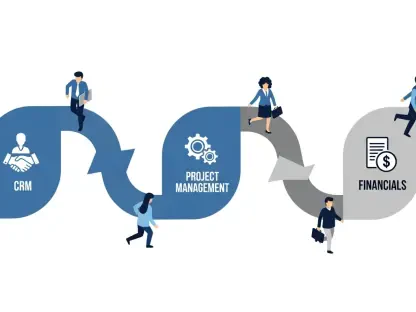In an era where digital interactions dominate daily life, the efficiency of user interfaces can significantly impact productivity, often determining how smoothly tasks are completed. Consider the frustration of repeatedly typing detailed inputs for AI tools or chatbots, whether booking a flight or generating a custom image, a challenge that has long plagued users of AI-driven applications. Enter Hero Startup’s Autofill SDK, a cutting-edge solution designed to streamline these processes through context-aware automation. This review dives deep into the capabilities of this technology, exploring how it transforms user experiences and what it means for the future of AI productivity tools.
Core Features Transforming User Input
Intelligent Context-Aware Suggestions
Hero Startup’s Autofill SDK stands out with its ability to predict and complete user inputs based on situational context. For tasks like scheduling travel, the system can automatically fill in fields such as destination, dates, and preferences, drastically cutting down on manual effort. This functionality is not just a convenience but a significant time-saver, allowing users to finalize actions with minimal clicks or keystrokes.
Beyond simple data entry, the technology adapts to nuanced user needs by learning from interaction patterns. Hero engineer Saharsh Vedi has noted that the SDK reduces the number of steps required to achieve results, a critical factor in enhancing user satisfaction. Such efficiency positions the tool as a vital asset for anyone seeking to optimize digital workflows in high-pressure environments.
Broad Compatibility with AI Platforms
Another strength of this SDK lies in its versatility across various AI applications. Whether supporting image and video generators by suggesting parameters like style or location, or aiding in chatbot conversations, the technology demonstrates remarkable adaptability. This flexibility ensures that developers can integrate it into diverse platforms without needing extensive customization.
The real-world impact of this compatibility is evident in how it boosts productivity for both end-users and developers. By providing a seamless way to define complex inputs, the SDK eliminates much of the trial-and-error typically associated with AI tools. Its ability to cater to a wide array of use cases sets it apart in a crowded market of specialized solutions.
Strategic Growth and Development Milestones
Funding and Expansion Plans
Hero Startup, founded by former Meta employees, has secured substantial financial backing to fuel its vision. Following an initial seed round, a recent $3 million funding injection led by Forerunner Ventures has bolstered its resources. This capital is poised to accelerate the rollout of the Autofill SDK, which is currently in an invitation-only phase for developers.
Testing within the Hero app, particularly for tasks like meeting scheduling, marks a crucial step in refining the technology. A broader release expected in the coming months will likely expand its reach, bringing the benefits of streamlined interaction to a wider audience. The startup’s focus on scalability ensures that growth remains sustainable as adoption increases.
Vision for User Interface Innovation
Looking ahead, Hero Startup is prioritizing simplicity in user interfaces, especially for emerging technologies like AR glasses. Limited screen real estate in such devices demands intuitive solutions, and the SDK’s context-aware features are well-suited to meet this need. This strategic direction reflects a deep understanding of evolving user expectations.
Co-founder Brad Kovalk has emphasized that decisions on future funding and partnerships will hinge on the app’s growth trajectory. By aligning development with market demands, Hero aims to maintain a competitive edge. This forward-thinking approach underscores the potential for the SDK to influence how digital interactions are designed in innovative spaces.
Practical Applications Across Industries
Impact on Diverse Sectors
The applicability of Hero’s Autofill SDK spans multiple industries, from travel and commerce to advertising and customer support. In travel, for instance, it simplifies booking processes by auto-populating critical details, enhancing user convenience. Similarly, in commerce, it speeds up transactions by predicting user preferences with precision.
In advertising, partnerships like the one with Koah Labs showcase the SDK’s potential for innovation. By integrating brand prompts into autofill suggestions, it enables AI-assisted campaigns that feel natural and engaging. Such implementations highlight how the technology can drive efficiency while opening new avenues for creative solutions.
Enhancing Digital Communication
A key benefit across these sectors is the reduction of message exchanges between users and systems. By anticipating needs and automating responses, the SDK makes interactions more intuitive, whether in customer support chats or e-commerce platforms. This streamlining effect is particularly valuable in scenarios where speed is essential.
The ability to minimize back-and-forth communication also improves user trust in AI systems. When processes feel effortless, adoption rates tend to rise, creating a positive feedback loop for both developers and end-users. Hero’s focus on practical outcomes ensures that the technology addresses real pain points effectively.
Challenges in Adoption and Scalability
Technical Integration Hurdles
Despite its promise, integrating the Autofill SDK into existing systems poses challenges for developers. The complexity of aligning context-aware algorithms with diverse app architectures can slow down deployment. Hero is actively working to simplify this process through comprehensive documentation and support.
Scalability remains another concern as the technology prepares for a broader rollout. Ensuring consistent performance across a growing user base will require robust infrastructure upgrades. Ongoing testing phases within the Hero app are critical for identifying and resolving such bottlenecks before they impact wider adoption.
Privacy and Regulatory Considerations
The use of context-aware data for autofill suggestions also raises questions about privacy. Ensuring compliance with global data protection standards is paramount to avoid potential backlash. Hero’s commitment to transparency in data handling will be crucial in building user confidence as the technology expands.
Regulatory scrutiny could further complicate deployment in certain regions, necessitating proactive measures. Collaborations with legal experts and continuous updates to privacy protocols are among the steps being taken. Addressing these issues head-on will determine how smoothly the SDK integrates into mainstream use.
Future Outlook for Autofill Innovation
Shaping the Next Generation of AI Tools
The potential evolution of Hero’s Autofill SDK points toward a transformative role in user-AI interactions. As platforms continue to diversify, the technology could become a cornerstone for productivity tools, especially in emerging fields like augmented reality. Its adaptability positions it as a leader in this space.
Anticipated advancements may include even deeper personalization, where the SDK learns from long-term user behavior to offer hyper-tailored suggestions. Such breakthroughs would further reduce friction in digital tasks, setting new benchmarks for efficiency. The industry impact of these developments could be profound, influencing design standards across sectors.
Long-Term Vision for Seamless Experiences
Hero Startup envisions a future where digital interactions are entirely seamless, with minimal user input required. The Autofill SDK is a stepping stone toward this goal, bridging current gaps in AI usability. Its ongoing refinement through partnerships and user feedback will be key to realizing this ambition.
As the technology matures, its integration into everyday tools could redefine how tasks are approached, from mundane scheduling to complex creative projects. Hero’s position at the forefront of this shift suggests a lasting influence on how digital experiences are crafted, promising a more intuitive world of interaction.
Final Thoughts and Next Steps
Looking back, Hero Startup’s Autofill SDK has proven to be a remarkable stride in enhancing AI-driven interactions, with its context-aware capabilities and versatile applications leaving a strong impression. The technology tackled inefficiencies head-on, delivering measurable reductions in user effort during testing phases. Its strategic funding and focused development underscore a commitment to impactful innovation.
Moving forward, stakeholders should prioritize robust support for developers to ease integration challenges, ensuring smoother adoption across platforms. Addressing privacy concerns through transparent policies will also be critical to sustaining trust as the SDK scales. For industries eager to leverage this tool, exploring pilot programs with Hero could unlock tailored solutions, paving the way for broader implementation in the evolving landscape of digital productivity.









